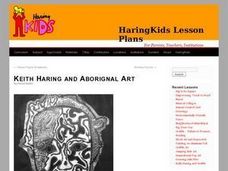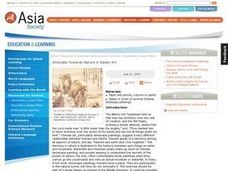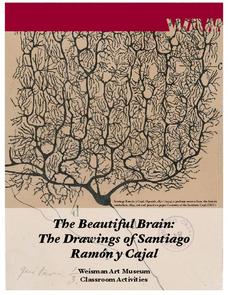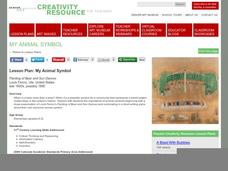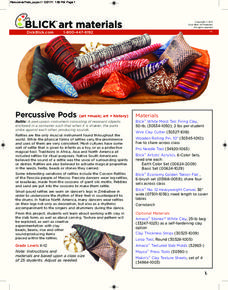Curated OER
Art of Ancient Civilizations
By studying the art of ancient civilizations, students can learn about the history and traditions of different cultures.
Curated OER
Keith Haring And Aboriginal Art
Students explore the art of Keith Haring and examine how it relates to Aboriginal art. In this fundamentals of art lesson, students examine the fundamental elements of art, such as, line, symmetry, contrast, balance, color tints, and...
Curated OER
The Art of Violence
Violence and human suffering, as represented in art and film, are the focus of an investigation of the power of visual images and the moral implications of such representations. Class members examine “Guernica,” Pablo Picasso’s massive...
Curated OER
Art and Artists: Diversity of Learners Adaptation
Students determine the style of place cards as well as how to display phots of artwork. They organize and design an art museum for parents and other students to enjoy. Students create place cards to explain the artwork, artist, as well...
Curated OER
Attitudes Towards Nature in Daoist Art
Students examine Daoist art. In this art appreciation lesson, students illustrate a poem, then create a second illustration in the Daoist fashion while focusing on depicting the harmonious relationship between humans and nature.
Curated OER
Allegory in Painting
Students examine how allegory is defined and used in the visual arts. They create a list of the arts, and list the objects, symbols, and figures that suggest each art category, analyze various paintings, and identify the allegorical...
Curated OER
Understanding Symmetry Through Visual Art
Have your class explore symmetry, radial balance and fractional parts in natural and man-made objects in their environment. Learners list examples and identify symmetrical and asymmetrical designs. Pupils are given a box of crayons and...
Teaching Tolerance
Buddy Share
Here's a project that gives academics the chance to share their opinions on social justice with storytelling, creative writing, or art. Scholars choose what they want to create and are assigned buddies to support their efforts. To...
University of Minnesota
Beautiful Brain: Do You See What I See?
Can art play tricks on your eyes, and can a still painting really appear to vibrate? The second instructional activity in a four-part series discusses the way our beautiful brains translate visual images. It highlights the style of...
Curated OER
What Shapes Can You See?
Students investigate shapes in art. In this visual arts lesson, students examine the ancient Panamanian "Plaque" and identify the geometric shapes in the art piece. Students combine basic shapes to make an artistic picture of their own.
National Gallery of Canada
Lumps, Bumps, Gritty, and Soft!
Texture can really add to a work of art. Explore texture through observation and practice. Learners view and discuss works of art by M.C. Escher. They then create their own texture samplers with six different materials.
Canada's National Arts Center
Vivaldi and The Four Seasons
Did you know that Vivaldi’s orchestra was largely made up of girls from an orphanage? Fun facts like this fill a 34-page teacher's kit designed to accompany a cross-curricular study of Vivaldi's The Four Seasons.
Curated OER
Self-Promotion
Middle schoolers create "assemblage boxes" displaying representations of themselves and the importance they see in their own lives. This middle school level lesson emphasizes the art of American artist Sarah Goodridge who has success in...
TED-Ed
Bringing a Pop-up Book to Life
Breath life into the pages of a text with this instructional video on creating pop-up books. From choosing a topic, through the planning and creation phases, this video examines how to develop engaging visual presentations that reach out...
Novelinks
Zach’s Lie: Guided Imagery
Close your eyes and picture a time where you decided to tell the truth to someone. What were you wearing? How did you feel? Such prompts begin a guided imagery activity for Zach's Lie. Directions for creating an environment conducive to...
University of Minnesota
Beautiful Brain: Strangest Dream
Do words change or add meaning or interest to a work of art? The final lesson in a four-part series on the beautiful brain as a work of art focuses on art analysis. Scholars write a story about exploring art from the inside. Reflections...
Curated OER
Come Tool Along With Me
Students create metallic Bas-relief scultures using basic art supplies and the technique of "tooling" in this Art lesson with croos-curricular connections in Social Studies and Math. A scoring rubric is included for assessment and...
Curated OER
Birch Bark Biting
Fifth graders create birch bark biting art pieces. For this aboriginal art lesson, 5th graders produce art using birch bark. Students present their art pieces and explain their designs.
Curated OER
Terrific Tessellations
Students create to pieces of artwork using two primary colors and tessellation techniques. This is an excellent lesson that can be accomplished using standard art techniques or educational software such as Adobe Photoshop or Microsoft...
Denver Art Museum
My Animal Symbol
Here is an art lesson plan that combines visual arts and language arts into one very nice package. In it, youngsters study a fascinating painting called Painting of Bear and Sun Dances. They begin to understand the importance of...
Dick Blick Art Materials
Percussive Pods
Combine the study of art, music, and history with an activity that asks kids to craft rattles out of slabs of clay.
Curated OER
Art Basics Scavenger Hunt
Hand out this instructional activity and lead your class on a scavenger hunt. Pupils look for examples of shape, form, balance, pattern, perspective, space, and depth. They draw and write about the examples they've found. A great...
PBS
Women's History: Glass Windows; Glass Ceilings
Discover stories about women's history in beautiful stained glass windows. The second in a three-part series teaches scholars about a famous artistic style of stained glass windows and the influential women that used art to impact...
Curated OER
6th Grade Art
Sixth graders create "macquette" sculptures, which would be models for larger playground pieces.



